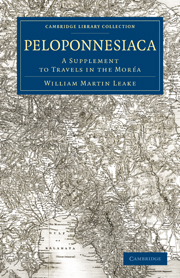SUPPLEMENT TO TRAVELS IN THE MOREA, VOL.II
Published online by Cambridge University Press: 16 May 2011
Summary
Bishop Thirlwall, in his History of Greece, disapproves of the assertion here made, that the site for the new city of Megalopolis was chosen by Epaminondas. Undoubtedly it rests upon the authority of Pausanias alone, who, in stating that Epaminondas was the οἰκιστὴς or founder both of Messene and Megalopolis, and that he selected the site for Messene, leads naturally to the inference that the site of Megalopolis was also chosen by him. There would at least be some difficulty in conceiving that it could have been determined without his approbation, which, under the circumstances, was nearly the same thing as selecting the situation. As the greatest master of the art of war then living, he was the first to be consulted on such a question. The Arcadian confederacy, with its accompaniment, the formation of a new city, if not a measure originating with him, was supported by his authority, which, at that moment, was supreme: the opposition of some of the Arcadians made only his immediate interference the more necessary; and he was so zealous in the prosecution of these designs, that he supplied 1000 Thebans to protect the Arcadians, while employed in building the walls, from interruption by the Lacedæmonians.
- Type
- Chapter
- Information
- PeloponnesiacaA Supplement to Travels in the Moréa, pp. 198 - 353Publisher: Cambridge University PressPrint publication year: 2010First published in: 1846

